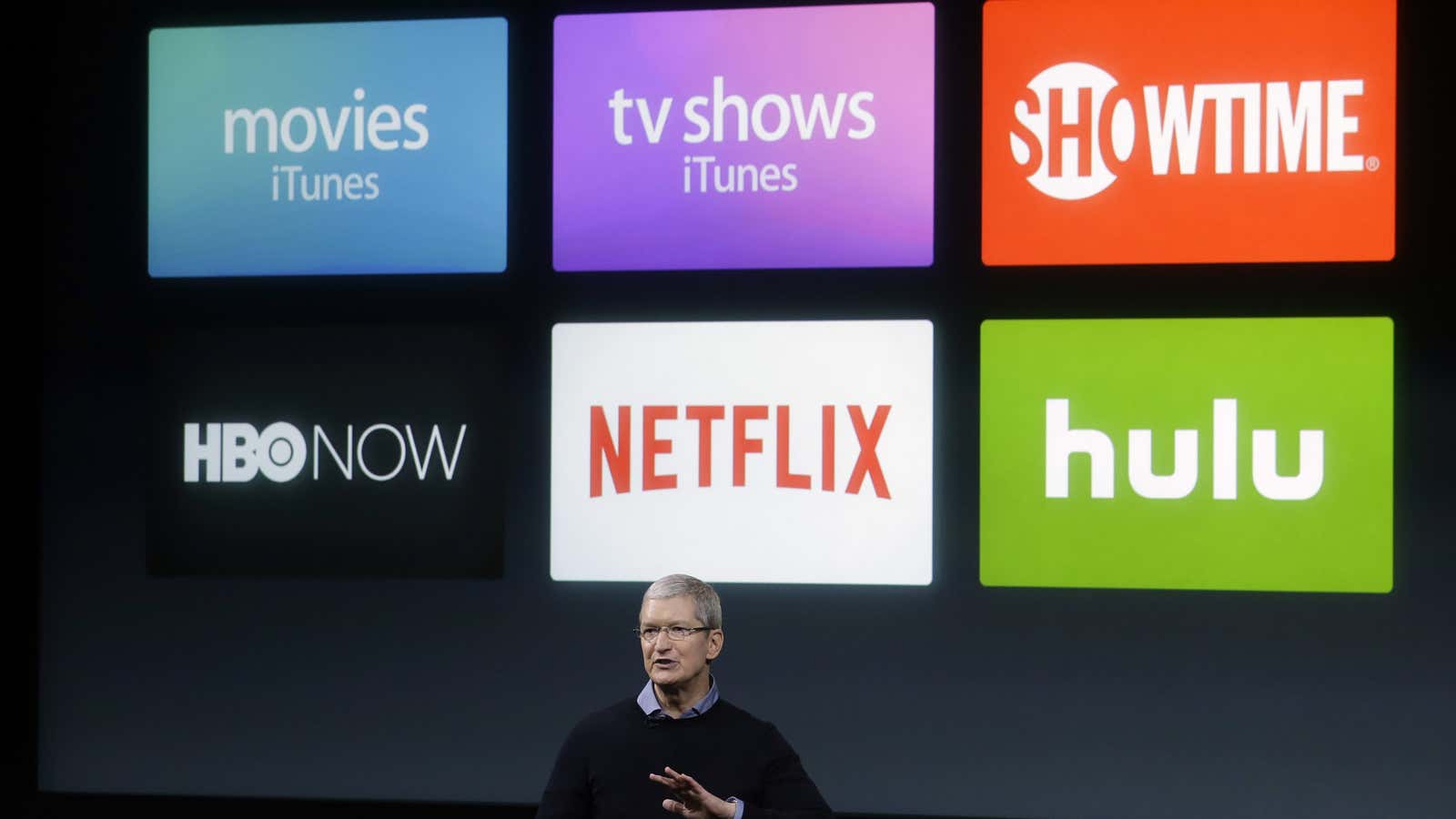Less than three years ago, amid speculation that Apple was eyeing a move into Hollywood content production, iTunes boss Eddy Cue said definitively that the tech giant wasn’t doing that.
“We’re not in the business of trying to create TV shows,” he said in 2015. “We’re not trying to compete with Netflix or compete with Comcast.”
Fast forward to today, and that’s exactly what Apple is doing. The company is engaged in a bidding war with HBO and other networks over J.J. Abrams’ next original TV show, according to the Hollywood Reporter. The industry trade magazine also reported that Apple recently won a bidding war over multiple unnamed outlets for comedian Kristen Wiig’s new series—her first TV role since leaving Saturday Night Live in 2012.
Apple is, in early 2018, unequivocally in the business of trying to create television shows.
Abrams’ series, called Demimonde, is billed as a “big-budget sci-fi family drama,” TVLine reported. HBO and Apple are the two favorites to land the coveted show, the first one Abrams’ created and wrote himself since Fringe in 2008. TVLine adds that the coveted filmmaker, who’s busy getting started on Star Wars: Episode IX, may direct some episodes of Demimonde too.
That Apple is even bidding side-by-side with the likes of HBO shows how much the TV industry has evolved in the short time since Cue said the company wasn’t much interested in the medium in 2015. That same year, HBO CEO Richard Plepler stood on stage at an Apple event—as a collaborator, not a competitor—to announce that his network’s new standalone streaming service, HBO Now, would debut exclusively on Apple devices. (It has since become available on many other platforms.)
In just three years, Apple has gone from a company that allies with cable networks like HBO and Showtime to one that directly competes with them.
When Apple was first toying with the idea of developing original content, most analysts presumed it merely to be a ploy to help sell iPhones and Apple Music subscriptions. But it increasingly looks as though the tech giant wants to do far more than that. Think of it less as a way to supplement an existing business and more as an attempt to diversify into a new one entirely. Apple wants to become a bona fide television network in its own right.
The company hired former Sony Pictures Television co-presidents Jamie Erlicht and Zack Van Amburg earlier this year to oversee its content ambitions. Since then, Apple has lured experienced TV executives away from Hulu, Amazon Studios, and WGN America to help lead its nascent content division.
The tech giant is attracting top Hollywood talent as well. In November, Apple landed an enticing TV project from Reese Witherspoon about a morning show, outbidding several suitors including Showtime, the Hollywood Reporter said. Apple has also picked up a space drama from Battlestar Galactica showrunner Ronald D. Moore and an anthology series produced by legendary director Steven Spielberg.
You don’t bid on talent like Reese Witherspoon and J.J. Abrams to boost your streaming music platform. You do it to beat HBO and Netflix. And Apple’s ambitions are already reverberating across the changing industry.
The Hollywood Reporter also revealed that Witherspoon’s lucrative deal with Apple for the morning show drama directly drove up the costs of the second season of HBO’s Big Little Lies, also starring (and produced by) Witherspoon. Since Big Little Lies was only imagined as a miniseries, the cast had to renegotiate contracts when the network greenlit the dark comedy for a second season. Witherspoon, Nicole Kidman, and the rest of the show’s star-studded cast reportedly leveraged the Apple deal to earn bigger paydays.
Apple is said to have a $1 billion content budget for 2018, far smaller than the outsized $8 billion of Netflix but well in the range of HBO, which spends around $2 billion on content per year in the era of Game of Thrones. The sudden insertion of another major billion-dollar player in the TV space is driving up costs in an already crowded industry.
“Every outlet has to make their own decisions about economics that make sense for them,” HBO programming chief Casey Bloys told the Hollywood Reporter. “I’m not going to shake my fist and say, ‘Darn it, Apple!’ If that’s what made sense for them for that show, God bless.”
Not everyone is so sanguine. Last year, FX CEO John Landgraf—who has leveraged his network’s relatively small budget with inspired curation and meticulous attention to quality—spoke of the “titanic struggle” between Silicon Valley power players like Netflix and now Apple, and channels like FX who now all battle for the same talent.
“I want the humans to hold their own against the emerging strength of the machines,” he said.
